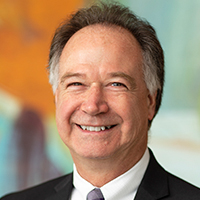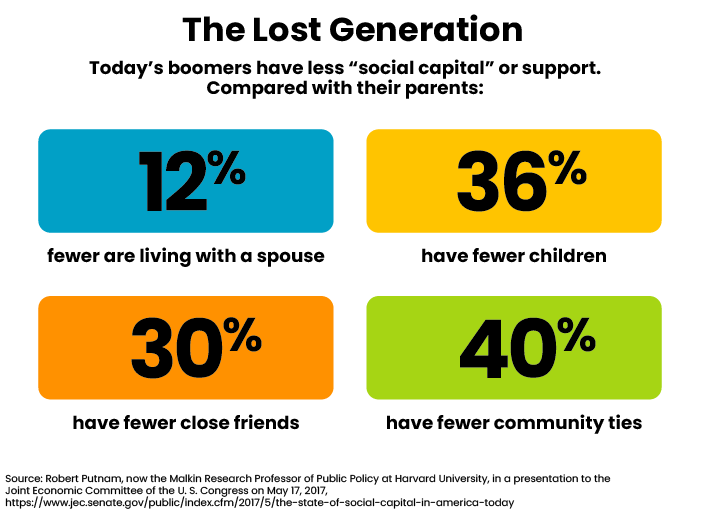
Christine was living by herself when Mike called her. Christine was a new client from a group of clients Mike had agreed to serve when another advisor retired. He called to see how he could best improve Christine’s financial picture.
When Mike met with Christine, he quickly identified that she did not have any estate planning documents in place. After encouraging Christine to fill this gap, Mike learned that Christine did not have people to fill the estate planning roles. She did have a sister that lived out of town but she did not trust that sister with her care.
Christine’s story is a familiar one. In the U.S., we encourage self-reliance and living independently; never mind that many of us could have more control over our situation if we reached out for help. We maintain our independence despite the significant evidence that loneliness triggers adverse health outcomes. Sometimes we maintain our independence whether we have a social network or not.
As a society, we rely on family mostly, sometimes friends, to take care of things. Things like driving to a doctor’s visit, getting groceries, doing a welfare check, providing some human contact.
Less Social Capital
Linda Camp is an independent researcher, writer and consultant in St. Paul, Minn., who has studied “solo seniors.” Solo seniors are individuals who, by choice or circumstance, function without the support system traditionally provided by family. The number of solo seniors is rising, she says. She notes that baby boomers at age 65 have fewer relationships or social capital than their parents did at the same age — research she attributes to Robert Putnam, a research professor of public policy at Harvard University (see chart).

In addition to having fewer family options, of course, not all families are supportive.
Christine won’t ask her sister to help. Another senior, Margaret, had been living by herself until her daughter, concerned about her behavior, pushed for a doctor’s exam. The diagnosis led to the appointment of a guardian. So Margaret, angry that her daughter forced the issue, specifically requested that her daughter not be assigned as her guardian.
Christine and Margaret may be correct that the natural choice is the wrong choice. When you are looking for someone to make health care and financial decisions for you, it is sometimes difficult to find someone you should trust.
Maintaining a Social Network
Continuing to socialize and combat loneliness has a significantly lower bar for finding help. Maintaining a social network can take many forms. I am sure everyone knows someone who seems to be trying to drive away those who want to socialize with them and support them.
Even if your client is not driving people away, recognize that sometimes maintaining even family relationships can take effort. Families also have many different characters. Encourage your clients to find a character or two in their family who will enjoy spending time with them, perhaps someone who shares their interests.
Creating a structure for socialization can make it easier for some people. If your client has common interests, they can structure around those interests.
Whether it is bird watching, playing cards or studying the Bible, when you share an interest, you can schedule a time to engage in that shared interest. You can schedule a three-mile walk every Wednesday morning. You can plan to eat lunch together every week after church. You can volunteer at the food kitchen on the third Saturday of each month. You can visit a new craft brewery every Friday.
“Getting out of the house, being in the presence of other human beings is essential for everyone’s mental and physical health.”
Getting out of the house, being in the presence of other human beings is essential for everyone’s mental and physical health.
With families getting smaller and more geographically dispersed, your clients may find it easier to socialize with friends or community/affiliation groups.
Community/affiliation groups might include a church, a gym, or an educational institution. These organizations tend to have activities that run on a regular schedule so a solo senior can plan their involvement. Whether or not your client knows any of the other members when they begin attending, it can be a great way to meet people who share their interests.
Forging Multi-Generational Relationships
James Gambone, PhD., author of “ReFire Your Life!”, believes individuals should consciously develop relationships across generations. These relationships encourage learning and growth because each generation has unique experiences that shape values and beliefs. You can also find people who share some of your interests through community groups. Book clubs, community service organizations and biking groups are a few groups that would likely have multiple generations actively participating.
The pandemic is certainly making all these activities harder. In lock-down, seeing people in person is impossible. And, while virtual visits are better than nothing, they are a poor substitute. Older seniors, those who are more likely to become isolated, also may be less likely to be technologically savvy.
The past year has been hard on everyone, but particularly hard on people in isolation. Fortunately, it appears we will be coming out of the worst of it over the summer.
“Solo seniors are particularly at risk of isolation, but it is quite possible to be lonely in a crowd.”
Solo seniors are particularly at risk of isolation, but it is quite possible to be lonely in a crowd. As your clients plan and make changes to their circumstances, encourage them to consider how easy it will be for them to continue to socialize on a regular basis. That rural retreat that provides peace and quiet for a couple may lead to isolation and difficulty socializing for the surviving spouse.
Encourage your clients to get involved in the community to build a multi-generational network of support in their 60s and 70s; it will provide dividends as they reach their 80s and 90s.
Also encourage your clients to socialize regularly. For many clients, this is easier to achieve by creating a schedule of activities, like weekly meetings. These kinds of activities help your clients maintain social relationships that can pay dividends, especially when multiple generations are involved.
Supporting Independence
Perhaps if they had regular social connections, Christine and Margaret would have been able to make connections to fill these estate planning roles. Perhaps your solo seniors can make connections that support their independence.
John Comer, CFP®, is a financial advisor with Twin Cities-based McNellis & Asato, Ltd., which offers financial planning and investment advisory services through Raymond James Financial Services, Inc. He is a coauthor of the forthcoming book “Joining the Longevity Revolution: For Advisors and Clients,” which is expected to be in print later this year. He can be reached at 952-548-3134. Any opinions are those of John and not necessarily those of Raymond James or McNellis & Asato.







